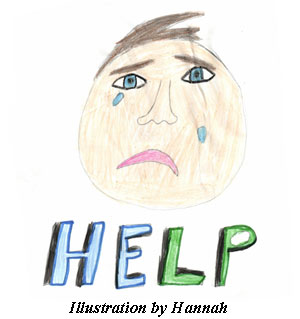
As I began my third week of blogging for hurting children, I first want to thank those of you who have subscribed to it, and also those who are reading and sharing it with your friends on Facebook and other social networks. This is a message that is dear to my heart and your interest tells me that it is also dear to you.
In my previous post entitled, Let the Children Come to Me, I talked about ways children are sometimes overlooked during a time of loss in their life. We discovered that the #1 reason children are overlooked and don’t receive the help they need in coping with their loss is that the primary adult in the child’s life just doesn’t know how to help him.
Today, I want to introduce you to Gail Johnson, a licensed professional counselor. Gail has spent years counseling adults, children, and teens, so I wanted to do an interview with her to help us get an over-all picture of a child in grief, and how we might begin to help him. I was privileged to have Gail endorse my book, Helping Hurting Children: A Journey of Healing.
- Gail, how did you come to choose counseling as your career field?
I began my career as a hairdresser. I was very interested in people and realized that if I really wanted to help people I needed to learn all I could. So, I left hairdressing, went to school and eventually became a Licensed Professional Counselor. - Tell us about your work in counseling families over the years.
Most of my work with younger children occurred when I worked at a school with P-K through 12th grade enrollment. I have also worked with at-risk children and adolescents, with adults in prison and with addicted teens and adults. Investigating their histories, I had the opportunity to see how these problems, particular problems of loss, followed the children on into their adult lives.Divorce and abandonment were the two prevalent issues. Abandonment is a natural result of one parent leaving the home. However, the custodial parent is often so overwhelmed with his or her own loss that the child feels emotionally abandoned by them also.
Of course, there were other losses as well including death, moving, loss of friends and pets.
- What are some of the behavioral signs that children and teens might exhibit that would indicate he needs help in dealing with a loss?
Look for changes from the norm. Expect some temporary regression in younger children. Their emotions will usually show up in their behavior and play. Monitor anger and aggression in older children and adolescents. Copious information is readily available on how children grieve at different developmental stages.Children’s sadness and negative behavioral changes should gradually decrease over time. If those negative behaviors are extreme or do not gradually begin to get better, say two to six months, it may be time for an evaluation by a professional.
Some signs children may need help are:
- Appearing trapped in a grief stage, unable to move on
- Continuing to exhibit chronic psychosomatic health problems
- Displaying acting-out behaviors and bad school performance
- No decrease of bad dreams or other fearful behavior and anxiety.
Get professional help immediately if the child becomes physically abusive to self or others as a means of coping with his anger and depression, or if there is suicidal ideation.
- What advice can you give to parents, grandparents, foster parents, or any caring adult that they could use in helping a child in grief?
Invite children to talk about their feelings and let them know you are available when they want to talk. Reassure them that they will be taken care of.If the parent must be unavailable for the child, like making funeral arrangements, etc., assign a loving adult to stay close to the child.
Keep to normal routines as much as possible.
Teachers and other adults interacting with the child need to be made aware of the situation.
Help children move from grieving to cherishing memories.
- Final thoughts of your own that you would like to share with our readers.
Children’s grief needs to be acknowledged. They need to be involved in the grieving process and allowed to mourn in the company of relatives and peers. Issues of loss and grief are best worked through as they occur and not delayed to be worked out years later, if ever.
***********
And that, my friends, is spoken by one who has spent her adult life counseling those who are hurting. I want to thank Gail for joining us and shedding light on this subject of losses and grief in children.
Are you seeing any of those behavior patterns in your child’s life that Gail described? If so, leave me a comment and let’s see what we can do to help him.
Be sure to join Hannah and me right here again next Tuesday.









